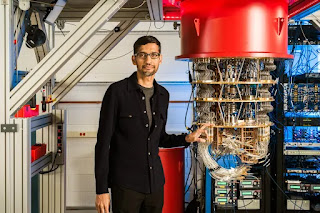MIT physicists have demonstrated a new form of magnetism that could one day be harnessed to build faster, denser, and less power-hungry " spintronic " memory chips. The new magnetic state is a mash-up of two main forms of magnetism: the ferromagnetism of everyday fridge magnets and compass needles, and antiferromagnetism, in which materials have magnetic properties at the microscale yet are not macroscopically magnetized. Now, the MIT team has demonstrated a new form of magnetism , termed "p-wave magnetism." Physicists have long observed that electrons of atoms in regular ferromagnets share the same orientation of "spin," like so many tiny compasses pointing in the same direction. This spin alignment generates a magnetic field, which gives a ferromagnet its inherent magnetism. Electrons belonging to magnetic atoms in an antiferromagnet also have spin, although these spins alternate, with electrons orbiting neighboring atoms aligning their spins antiparalle...






Comments
Post a Comment